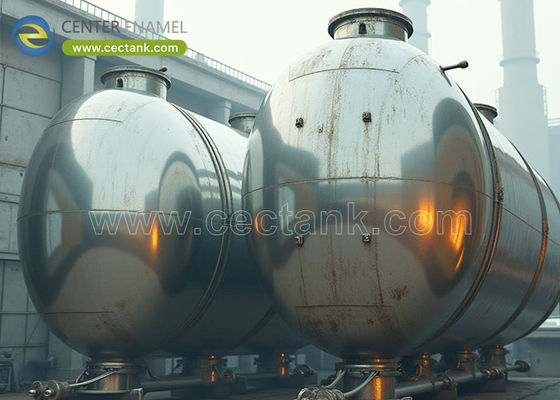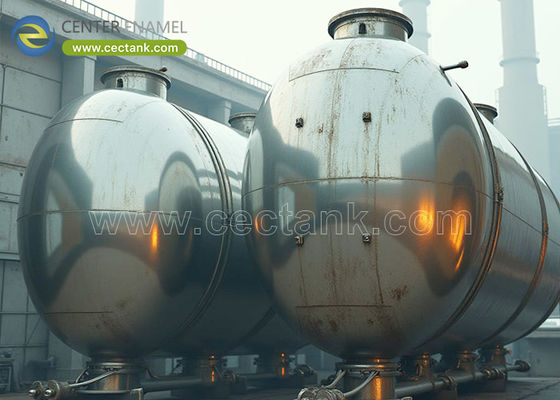-
Glas gesmolten met stalen tanks (419)
-
roestvrij staaltanks (410)
-
De fusie plakte Epoxytanks (424)
-
Gegalvaniseerde stalen tanks (321)
-
De Daken van de aluminiumkoepel (872)
-
Opbergtanks voor afvalwater (226)
-
gelaste stalen tanks (297)
-
Drukvaten (295)
-
Anaërobe Autoclaaf (201)
-
Industriële Watertanks (349)
-
Gelaagde stalen tanks (180)
-
Vastgeboute Staaltanks (181)
-
De Tank van de modderopslag (115)
-
De Tank van de biogasopslag (173)
-
Leachatopslagtanks (133)
-
Landbouwwateropslagtanks (179)
-
Brandwatertank (166)
-
Graanopslagplaatsen (130)
-
Biogas projecten (349)
-
Waterzuiveringsinstallatieprojecten (270)
-
Doppel membraan dak (223)
Gelaste stalen tanks: De ruggengraat van industriële opslagoplossingen
| Plaats van herkomst: | CHINA |
| Merknaam: | CEC TANKS |
| Certificering: | ISO 9001:2008, AWWA D103 , OSHA , BSCI |
| Modelnummer: | W |
| Min. bestelaantal: | 1Set |
| Prijs: | $5000~$20000 one set |
| Verpakking Details: | PE poly-foam tussen elke twee stalen platen; houten pallet en houten |
| Levertijd: | 10-30 dagen nadat de aanbetaling is ontvangen |
| Betalingscondities: | L/c, t/t |
| Levering vermogen: | 60 sets per maand |
|
Detailinformatie |
|||
| Plaats van herkomst | CHINA | Merknaam | CEC TANKS |
|---|---|---|---|
| Certificering | ISO 9001:2008, AWWA D103 , OSHA , BSCI | Modelnummer | W |
| Corrosieweerstand: | Geschikt voor afvalwaterzoutwater, zeewater, ruwe olie met hoge zwavel, zoutvos, organische en anorg | Elastisch: | Hetzelfde als stalen laken |
| Tanklichaam kleur: | Aangepast ontwerp | Coatingdikte: | Aangepast |
| Fundering: | Concreet | Staalkwaliteit: | roestvrij staal |
| Markeren: | gelaste stalen industriële opslagtanks,zware gelaste stalen tanks,industriële gelaste stalen tanks |
||
Productbeschrijving
Gelaste Stalen Tanks: De Ruggengraat van Industriële Opslagoplossingen
Gelaste stalen tanks spelen een cruciale rol in industriële opslagsystemen wereldwijd. Hun veelzijdigheid, duurzaamheid en efficiëntie maken ze onmisbaar in sectoren zoals petrochemie, landbouw, waterzuivering, voedselverwerking en nog veel meer. Als global marketing writer bij Shijiazhuang Zhengzhong Technology Co., Ltd (Center Enamel), zal ik een uitgebreid overzicht geven van gelaste stalen tanks — met details over hun ontwerp, productieproces, voordelen, toepassingen en innovaties.
Introductie tot Gelaste Stalen Tanks
Gelaste stalen tanks zijn grote containers die voornamelijk zijn geconstrueerd uit stalen platen die door lassen aan elkaar zijn verbonden. In tegenstelling tot tanks met bouten, bieden gelaste tanks een naadloze barrière, waardoor ze ideaal zijn voor het opslaan van vloeistoffen en gassen onder verschillende omstandigheden. De sterkte en lasintegriteit van deze tanks zorgen voor lekvrije prestaties en langdurige betrouwbaarheid.
Afhankelijk van de ontwerpcriteria en het beoogde gebruik, kunnen gelaste stalen tanks in verschillende typen worden ingedeeld:
- Tanks met Vast Dak: Meestal gebruikt voor het opslaan van vloeistoffen zoals olie en chemicaliën, deze tanks hebben een dak dat permanent aan de romp is gelast.
- Tanks met Drijvend Dak: Ontworpen voor vluchtige vloeistoffen zoals benzine; hun drijvende dak stijgt en daalt met het vloeistofniveau, waardoor verdampingsverliezen worden verminderd.
- Opslagsferen: Sferische gelaste tanks die worden gebruikt voor hogedrukgassen.
- Cryogene Tanks: Gespecialiseerde gelaste tanks voor opslag van vloeibaar gas bij extreem lage temperaturen.
- Verticale en Horizontale Stalen Tanks: Gebaseerd op oriëntatie om te voldoen aan installatie- en handlingvereisten.
De staalsoorten die worden gebruikt voor de tankproductie variëren van koolstofstaal tot speciale legeringen, geselecteerd op basis van de chemische compatibiliteit, temperatuur en drukvereisten van het opgeslagen medium. Gemeenschappelijke normen zoals ASTM A36, A516 Grade 70 en andere begeleiden de materiaalselectie.
Lastechnieken die cruciaal zijn voor de tankconstructie omvatten:
- Afgeschermd Metalen Booglassen (SMAW)
- Gas Metalen Booglassen (GMAW/MIG)
- Flux-Cored Booglassen (FCAW)
Deze methoden zorgen voor volledige penetratielassen die voldoen aan strenge veiligheids- en kwaliteitsnormen.
Productieproces van Gelaste Stalen Tanks
- Materiaalinkoop en Voorbereiding
- Stalen platen worden geïnspecteerd en op maat gesneden volgens de ontwerp specificaties. De te lassen randen worden afgeschuind en zorgvuldig voorbereid.
- Romp- en Dakmontage
- De tankrompplaten worden in secties gelast om cilindrische segmenten te vormen, die vervolgens aan elkaar worden verbonden. Voor tanks met drijvend dak of vast dak worden de dakelementen afzonderlijk vervaardigd.
- Lassen en Inspectie
- Robot- en handlassers voeren rupslassen uit, gevolgd door niet-destructieve testmethoden (NDT) zoals ultrasoon onderzoek of radiografische inspecties om de lasintegriteit te verifiëren.
- Oppervlaktebehandeling
- De tanks ondergaan oppervlaktevoorbereiding zoals zandstralen en coatings — epoxy, email of polyurethaan — om te beschermen tegen corrosie.
- Eindmontage en Testen
- Tanks ondergaan hydrostatische of pneumatische tests om een lekvrije werking te garanderen vóór levering.
Voordelen van Gelaste Stalen Tanks
- Sterkte en Duurzaamheid
- Gelaste tanks bieden superieure mechanische sterkte en kunnen interne en externe druk met veerkracht aan.
- Lekvrij Ontwerp
- Continue lassen elimineren hoekstukken of bouten die tot lekkagepunten zouden kunnen leiden, essentieel voor de opslag van gevaarlijke stoffen.
- Aanpassingsvermogen
- Tanks kunnen worden ontworpen volgens precieze volume-, druk- en structurele vereisten, inclusief isolatie- of voeringopties.
- Kosteneffectiviteit
- Lange levensduur in combinatie met lage onderhoudskosten levert een uitstekende waarde voor de investering op.
- Compatibiliteit
- Geschikt voor een breed scala aan materialen — van drinkwater tot corrosieve chemicaliën.
Toepassingen in Verschillende Industrieën
- Olie en Gas
- Opslag van ruwe olie, geraffineerde producten en vloeibaar aardgas, waarbij tanks met drijvend dak de VOC-emissies verminderen.
- Chemische Verwerking
- Tanks zijn bestand tegen corrosieve stoffen en ondersteunen chemische reacties of bulkopslag.
- Water- en Afvalwaterzuivering
- Grote gelaste stalen tanks dienen als reservoirs, clarifiers of vergisters in gemeentelijke en industriële installaties.
- Landbouw
- Opslag van vloeibare meststoffen, pesticiden en irrigatiewater.
- Voedsel en Dranken
- Tanks met sanitaire voering voor eetbare oliën, wijn en andere voedselgerelateerde vloeistoffen.
- Mijnbouw en Minerale Verwerking
- Opslag van slurries, chemicaliën en proceswater.
Innovaties en Trends in Gelaste Stalen Tanktechnologie
- Geavanceerde Beschermende Coatings
- De ontwikkeling van emailcoatings door Shijiazhuang Zhengzhong Technology verbetert de corrosiebestendigheid en het reinigingsgemak.
- Automatisering in Lassen
- Toenemend gebruik van robotica verbetert de lasprecisie en verkort de productietijd.
- Slimme Tank Monitoring
- Integratie van sensoren voor real-time niveau-, temperatuur- en structurele gezondheidsmonitoring.
- Milieu-naleving
- Adoptie van gesloten drijvende daken en dampterugwinningssystemen om te voldoen aan strenge emissievoorschriften.
Kwaliteitsnormen en Certificeringen
Gelaste stalen tanks voldoen wereldwijd aan normen zoals API 650 (American Petroleum Institute), AWWA D100 (American Water Works Association) en EN 14015 (Europese Norm). Center Enamel’s tanks voldoen aan deze internationale benchmarks en bieden betrouwbare, gecertificeerde producten die zijn afgestemd op diverse marktbehoeften.
Gelaste stalen tanks zijn fundamentele componenten in industriële opslag en bieden ongeëvenaarde duurzaamheid, veiligheid en flexibiliteit. Met de vooruitgang in productie, monitoring en beschermende coatings blijven deze tanks evolueren en betrouwbare service bieden in meerdere sectoren. Shijiazhuang Zhengzhong Technology Co., Ltd (Center Enamel) staat vooraan door hoogwaardige gelaste stalen tanks te leveren met geavanceerde emailcoatingtechnologieën, die voldoen aan de strenge eisen van wereldwijde klanten.
![]()
Wilt u dat dit artikel wordt aangepast om een bepaalde industrie of tanktype uitgebreider te benadrukken?




